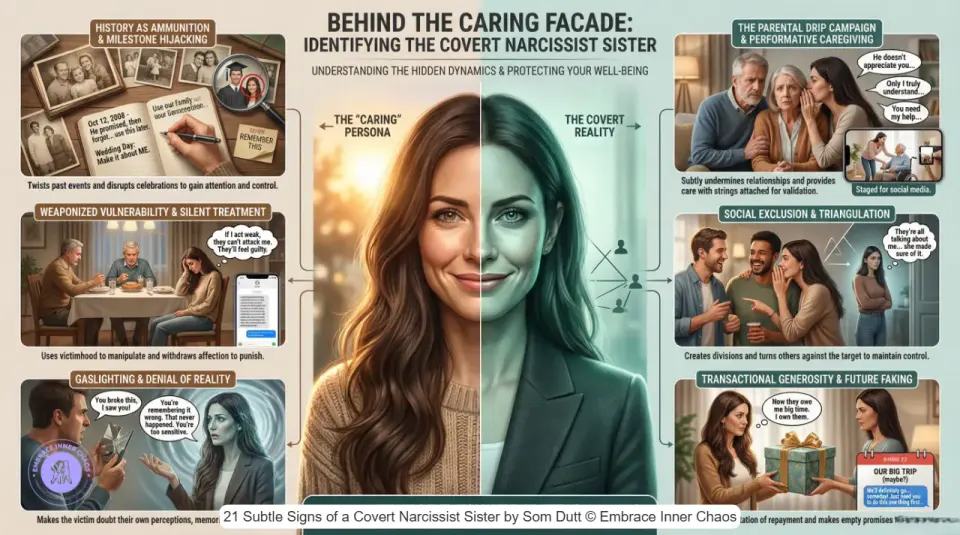Last updated on January 27th, 2026 at 04:46 am
A covert narcissist sister weaponizes something no one else can: your shared history. She was there for your childhood. She knows your insecurities because she watched them form. And she uses every bit of it while the rest of the family sees only her caring public face.
You feel exhausted, confused, and you second-guess yourself around her all the time. Your stomach drops when you see her name on your phone. You dread family gatherings for days beforehand. Meanwhile, your parents think she’s wonderful.
You’re not imagining it. This isn’t regular sibling rivalry or a difficult sister relationship. A difficult sister shows occasional challenging behavior with capacity for accountability. A covert narcissist sister demonstrates consistent manipulation, never accepts genuine blame, lacks real empathy, and chips away at you while appearing victimized. In my 7 years coaching over 1,400 survivors of covert narcissistic abuse, the sister relationship creates specific damage because shared parents become weapons and family loyalty becomes a trap. These 21 signs name what you’ve been experiencing.
TL;DR
Shared History Weaponized: She rewrites childhood memories, distorting real events with fabricated interpretations because she was there and no one else can verify the truth.
Triangulation Tactics Exposed: She runs drip campaigns with parents, spreads selective misinformation, and turns family members into flying monkeys who monitor you without realizing they’ve been recruited.
Victim Identity as Control: The DARVO cycle (Deny, Attack, Reverse Victim and Offender) completes itself every time you raise a legitimate concern, leaving you apologizing for your own grievance.
Performative Caregiving Pattern: She handles visits that photograph well while you manage prescriptions, appointments, and midnight calls with zero recognition.
Hot-and-Cold Trauma Bonding: Love bombing followed by silent treatment creates intermittent reinforcement, a psychological pattern that keeps you confused and emotionally hooked.
Shared History Becomes Ammunition
1. A Covert Narcissist Sister Rewrites Childhood to Cast Herself as Victim
That fight when you were twelve? In her version, you attacked unprovoked. Your accomplishments become evidence of favoritism she suffered through. “You were always the dramatic one.” “Mom and Dad walked on eggshells around you.” “You made my childhood miserable.” She rewrites both events AND your personality using shared history no one else can verify.
This sister-specific gaslighting cuts deeper than any outsider’s manipulation because she WAS there. She knows the details. When she distorts them, you can’t appeal to external evidence. She references real events with fabricated interpretations. She quotes things you “said” twenty years ago. Your parents heard her version first, so your corrections sound like defensiveness. This memory revisionism continues throughout adulthood, with childhood achievement dismissal and adult success minimization becoming her go-to behavior.
2. A Covert Narcissist Sister Deploys Your Past Mistakes at Family Gatherings
“Remember when you failed that test?” She delivers it laughing at Thanksgiving, when everyone’s watching. If you react, you can’t take a joke. She maintains a mental archive of your embarrassments that never expires. Your teenage struggles, your failed relationships, your lowest moments remain available for public deployment while her own mistakes never surface.
Holiday gatherings become minefields where any celebration of your success triggers her subtle sabotage. She creates drama through “accidental” disruptions and makes backhanded compliments about your appearance or life choices. Birthday disruption. Wedding sabotage. She sets herself up as the helpful victim needing attention while you become the target. Understanding covert narcissist subtle criticism helps you recognize these moments for what they truly are.
3. A Covert Narcissist Sister Denies Private Conversations Ever Happened
You discussed splitting costs for mom’s birthday. She agreed. Now she claims that conversation never happened. Her calm delivery makes you sound unhinged. She targets conversations without witnesses on purpose. Your call when nobody was home. The agreement made in the car. Her word against yours, every time.
This selective memory manipulation goes even further when she feigns ignorance after being confronted. “I don’t know what you’re talking about.” “You must have dreamed that.” Common gaslighting techniques include denying events, twisting your words, blame-shifting, withholding information on purpose, and projection, where she accuses you of the very behaviors she exhibits. You’ve started recording conversations because reality feels unstable around her.
4. A Covert Narcissist Sister Knows Which Buttons to Push Because She Installed Them
She watched your childhood wounds form. She knows what makes you feel small, unworthy, or defensive. And she uses that knowledge with surgical precision. That comment about your weight lands because she remembers when you were bullied for it at thirteen. That dig about your career stings because she saw how much Dad’s disapproval hurt you. These are classic covert narcissist belittling tactics designed to undermine your confidence.
No outsider could wound you this well. She has decades of research on your vulnerabilities. A covert narcissist sister is harder to recognize than a covert narcissist partner. Family members often normalize behaviors experienced since childhood, dismissing the abuse as “sibling rivalry” when it’s sibling intimidation through persistent criticism and comparison.

A covert narcissist sister manufactures conflict at family meals while positioning herself as the peacekeeper victim.
Parent Manipulation and Family Triangulation
5. A Covert Narcissist Sister Performs Caregiving Only When Witnessed
She drives three hours to bring mom flowers and posts about it on social media. But when your mother needs daily help, she’s unavailable. You handle prescriptions, appointments, and midnight calls with no recognition. She handles the visits that photograph well. The family credits her devotion. This stark contrast between covert narcissists public vs private behavior reveals her true character.
When you point out the performance, she becomes the victim of your jealous attack. “I can’t believe you’d say that after everything I’ve done.” This martyr complex deflects accountability while setting her up for inheritance and parental favor.
6. A Covert Narcissist Sister Runs a Drip Campaign Against You With Parents
“I’m just worried about her drinking.”
“Her kids seem so unsupervised.”
“She seemed stressed last time I saw her.”
Each concerned comment plants doubt without accusing you outright. This is triangulation in action. She spreads selective misinformation to create family alliances while maintaining plausible deniability.
When parents confront you, she acts confused: “I never said that!” She manipulates narratives, telling different stories to different people. Your own parents look at you different now because she’s put herself between you and your support system. She’s turned them into flying monkeys who monitor and report your behavior without realizing they’ve been recruited.
7. A Covert Narcissist Sister Claims Peacekeeper While Manufacturing Conflict
“I just want everyone to get along.” She says this while telling you what your brother “really thinks” about you and sharing your private comments with cousins. She plays double agent, gathering intelligence from each family member and deploying it to create division.
Then she appears at gatherings as the reasonable mediator. The family praises her harmony-keeping while you carry the “difficult” label. She plays siblings against each other: “Why can’t you be more like your brother?” “Mom likes me best because I help her.” This creates a culture of secrecy where family members hide their real feelings, afraid to upset the balance she controls. Pay attention to covert narcissist body language silent cues during these interactions to decode her true intentions.
8. A Covert Narcissist Sister Uses Elderly Parent Care as a Control Tool
She volunteers for power of attorney and controls medical decisions. Access to aging parents becomes a bargaining chip. She restricts your visits, withholds medical information, and makes decisions without consulting you. She may exaggerate medical symptoms or use hypochondria tactics to gain attention.
Financial manipulation covers inheritance games, loan requests she never repays, and property games like “borrowing” possessions she forgets to return or causing “accidental” damage. She uses help as a weapon: disagree with her, and she brings up what she did for you. She sets herself up as deserving of larger shares through estate planning interference while you’re framed as the absent, ungrateful sibling. Learning how to deal with a covert narcissistic sister becomes essential for protecting yourself in these situations.
The Permanent Victim Identity
9. A Covert Narcissist Sister Shuts Down Concerns With “After Everything I’ve Done”
This phrase ends every legitimate conversation. You address a boundary violation. And now you’re attacking someone who sacrificed so much. Her accounting runs one way: she remembers every favor performed, forgets every favor received. She exaggerates hardships, making small inconveniences sound like heroic sacrifices.
This victim mentality serves a purpose: seeking sympathy from family while making you look like the problem. She expects gratitude for small favors and reminds you over and over. She gives no sincere apologies. When confronted, she makes excuses, shifts blame, or plays victim instead. You walk in with a grievance, walk out apologizing. The DARVO cycle (Deny, Attack, Reverse Victim and Offender) completes itself every time.
10. A Covert Narcissist Sister Claims You Were “Always the Favorite” to Justify Cruelty
This perceived favoritism becomes lifetime justification. According to a peer-reviewed study by Dr. Tas Ferencz, perceived paternal favoritism and narcissistic traits significantly impact sibling warmth and conflict levels in family systems, meaning her grievance—whether grounded in reality or not—creates a foundation that excuses current cruelty. She exploits golden child and scapegoat roles, casting herself as the overlooked child regardless of actual parental treatment. Siblings become scapegoats while she gains undue favor from parents.
You were privileged, so anything she does now balances scales. The impossible spot: you feel guilty for existing, minimize your struggles, and walk on eggshells around success because good news triggers her jealousy masked as hurt.
11. A Covert Narcissist Sister Times Her Crises to Overshadow Your Milestones
Your engagement announcement coincides with her emergency. Your promotion overlaps with her breakdown. Your pregnancy announcement gets hijacked by her health scare. The attention hijacking seems coincidental until you notice the cycle spanning years.
She maintains plausible deniability: how could she control timing? You’re paranoid for noticing. But survivors report this milestone sabotage appearing across every major life event over and over. What triggers this? Your achievements, attention shifting away from her, and any situation threatening her need for validation.
12. A Covert Narcissist Sister’s Problems Always Override Yours
You mention a hard day. She counters with her harder week. You share a health concern. She escalates with a worse diagnosis. This competitive suffering and illness competition keeps her problems above yours at all times. She monopolizes family emotional resources through chronic complaining and exaggerated struggles.
When you share good news, she shifts focus back to herself right away. Your moments don’t matter. She wants the spotlight, even if she takes it in a soft way. You’ve learned to never share good news because her response makes you regret speaking.

Understanding how a covert narcissist sister weaponizes vulnerability, future faking, and social exclusion to maintain control.
The “Concerned Sister” Disguise
13. A Covert Narcissist Sister Delivers Criticism Through Backhanded Compliments
“I’m just worried about your weight.”
“Are you sure you can handle that promotion?”
“You’re so brave to wear that.”
“You did well for someone with your background.”
“Not everyone could pull that off.”
The criticism laundering turns attacks into care through concern-trolling.
These backhanded compliments sound innocent to outsiders but carry intended insults. Instead of confronting you head-on, she might say “I guess some people are just too busy for family,” implying resentment without addressing anything. As Dr. Briana Casali notes in her clinical review, this passive-aggressive communication style is a defining hallmark of covert narcissistic behavior. Years of “helpful” observations become your internalized inner critic.
14. A Covert Narcissist Sister Minimizes Your Achievements While Inflating Her Own
When you tell her good news, she says it’s not special right away. “Anyone could do that.” “It’s not as hard as you think.” Your happiness disappears. She wants her accomplishments to look better than yours. She slips her accomplishments in casual: “I barely studied, but I still got the highest grade.”
She compares you to others: “Why can’t you be more like her?” “He did it faster than you.” She points out your flaws, more so when others are around. This educational achievement minimization and career undermining creates a sense of failure. You feel embarrassed and lose confidence every time you try something new.
15. A Covert Narcissist Sister’s Gifts Target Your Insecurities
The diet cookbook. The self-help book about your “issues.” The clothing in the wrong size. Each “thoughtful” gift carries a message about your inadequacy. Complaining makes you ungrateful. “I was just trying to help!” The covert insult arrives wrapped in ribbon.
She does gift-giving one-upmanship, making sure her presents to parents always outshine yours. She provides conditional support only when it benefits her. If you succeed, she says, “I always knew you could do it, because I helped you.” Her support feels like a reward you must earn.
Boundary Violations Only a Sister Could Execute
16. A Covert Narcissist Sister Shares Your Secrets Under Concern’s Guise
You told her about therapy. Now the whole family knows. You mentioned marriage struggles. Now cousins are asking questions. Your vulnerability becomes currency she spends free of guilt. “I was just so worried about her.”
This privacy violation runs under sisterly concern while your private struggles become family gossip. She invades privacy without asking, reads your messages, and acts like your boundaries don’t matter. This boundary testing includes incessant questioning about personal matters and disregarding your time by interrupting plans all the time. You’ve learned to tell her nothing, which means you’ve lost the sister relationship you wanted.
17. A Covert Narcissist Sister Infiltrates Your Relationships as Flying Monkey Recruiter
She befriends your spouse. She wins over your in-laws. She charms your closest friends. This isn’t friendliness. It’s intelligence gathering, social circle infiltration, and alliance building. She spreads rumors that change how people see you through subtle smear campaigns.
When your husband defends her over you in conflicts, you realize she’s triangulated your marriage. This relationship interference is on purpose. When friends know things you didn’t tell them, the information leak traces back to her. Party invitation exclusion becomes another tool. Your support system has been compromised from the inside.
18. A Covert Narcissist Sister Uses Your Children as Pawns
The “fun aunt” undermines your parenting with calculated permissiveness. She gives them sugar when you’ve said no. She buys toys you rejected. Your children hear “Mom’s so strict” messaging that puts you in the villain role.
When you enforce boundaries, she withdraws from your kids. They notice. They ask why Auntie doesn’t visit anymore. The conditional affection punishes you through your children’s confusion. She does niece/nephew manipulation and may attempt grandparent alienation, competing for your children’s loyalty through excessive gift-giving and rule-breaking.

A covert narcissist sister infiltrates your social circle to spread rumors and isolate you from support systems.
Covert Control Through Emotional Manipulation
19. A Covert Narcissist Sister Creates Impossible Loyalty Tests
“If you really loved me, you would…” Missing her event for your child’s recital becomes betrayal. Family obligation gets weaponized to enforce enmeshment. Your individuation reads as abandonment. She dictates choices, telling you what to wear, who to talk to, how to spend your time.
She undermines your independence. When you try to do things alone, she puts you down or makes you feel guilty through guilt-tripping. Either you comply and lose yourself, or refuse and become the family villain. This double bind creates learned helplessness. There’s no option where you win.
20. A Covert Narcissist Sister Cycles Between Love Bombing and Devaluation
The cycle repeats: she showers you with kindness, gifts, compliments. You feel special and start to trust her again. Then she starts putting you down, making small insults, ignoring your feelings. The love bombing doesn’t last long before devaluation begins.
The silent treatment lasts months without explanation. She ignores texts, screens calls, acts like you don’t exist. This emotional withdrawal punishes you for perceived slights. She may display sudden anger over minor issues. Then warmth returns out of nowhere. She acts like nothing happened.
This hot-and-cold behavior creates a rollercoaster relationship. Her moods change fast: one moment happy, the next angry or distant. She procrastinates on shared responsibilities on purpose. The intermittent reinforcement creates trauma bonding. You never know which sister you’ll encounter.
21. A Covert Narcissist Sister Acts Persecuted When You Set Any Boundary
You ask her not to share your personal information. She cries to your mother about how you’ve “cut her off.” You decline an invitation. She tells the family you’re “punishing her for something she doesn’t understand.” Every boundary becomes evidence of your cruelty toward her.
She ignores your requests and keeps going even when you say it hurts you. As clinical expert Fern Schumer Chapman explains, narcissistic behaviors in siblings create toxic patterns that often lead to family estrangement—and your sister frames your self-protection as the cause rather than her behavior. The family rallies to comfort her while you become the aggressor for asking to be treated with respect.
What Research Reveals About Covert Narcissist Sister Behavior
Dr. Craig Malkin, Harvard psychologist and author of Rethinking Narcissism, identifies vulnerable narcissism as distinct from the grandiose type most people recognize. Vulnerable narcissists seek validation through pity and rescue rather than obvious admiration. Unlike overt narcissists who demand attention through grandstanding, a covert narcissist sister appears shy or victimized while manipulating behind scenes. She wears a mask of humility that makes her harder to identify. Malkin notes these individuals experience “genuine shame and insecurity” while still lacking empathy for others.
Dr. Ramani Durvasula, clinical psychologist and narcissistic abuse specialist, documents how family systems protect covert narcissists because the behavior stays hidden. She observes that covert narcissists are “wolves in sheep’s clothing” and families often side with them because their manipulation appears as sensitivity or concern.
Research on sibling abuse by Caffaro and Conn-Caffaro found that sibling aggression gets dismissed as “normal rivalry” all the time, even when signs indicate psychological abuse. Parents often minimize sibling conflicts, creating environments where covert abuse continues unchecked. Vernon Wiehe’s research on sibling survivors found emotional abuse by siblings produced lasting effects including:
- Depression
- Diminished self-worth
- Chronic self-doubt
- Difficulty trusting others
According to Psychology Today, covert narcissism in families creates an environment where you doubt yourself all the time while she maintains control through emotional manipulation, boundary violations, and unpredictable reactions. The confusion you experience isn’t a personal failing. It’s the intended effect of calculated covert manipulation by someone who knows which buttons to push because she helped install them.
Recognizing the Covert Narcissist Sister Signs
You’re not imagining these signs. A covert narcissist sister works through confusion, victim games, and family triangulation. She exploits shared history no outsider could access. She manipulates parents who want to believe both their children are good people. The whole experience is draining. Recognizing these cycles helps you understand that the problem was never you.
FAQs
What Is The Biggest Myth About A Covert Narcissist Sister?
Many people think she cannot hurt others because she seems quiet or shy. Studies show covert narcissists use sneaky actions that can hurt just as much as being openly mean.
Do Covert Narcissist Sisters Act The Same In Public And Private?
No, she acts nice and friendly in public but can be mean or cold at home. Studies show covert narcissists often hide their real actions from people outside the family.
How Do You Know If Your Sister Is A Covert Narcissist?
She displays subtle manipulation through guilt-tripping, playing victim, passive-aggressive comments, and emotional withdrawal. She undermines your achievements while appearing caring to others, making you question your reality through gaslighting.
What Are The Red Flags Of A Covert Narcissistic Sister?
Chronic jealousy disguised as concern, refusal to give sincere apologies, boundary violations, backhanded compliments, silent treatment punishment, and consistently making herself the victim in family conflicts.
How Does A Covert Narcissistic Sister Treat Her Siblings?
Through subtle control tactics: competing for parental attention, spreading rumors, withholding information, emotional manipulation, exploiting vulnerabilities, and creating division through triangulation while maintaining innocent appearance.
How Does A Covert Narcissistic Sister Behave At Family Events?
She creates drama through “accidental” disruptions, makes backhanded compliments about your appearance or life, and positions herself as the helpful victim needing attention.
Why Does My Covert Narcissist Sister Copy Everything I Do?
Covert narcissists lack authentic identity and target successful siblings, copying your style, career choices, or hobbies while competing to do them “better” than you.
How Do Covert Narcissistic Sisters Manipulate Family Members?
Through guilt-tripping, emotional blackmail, playing victim, triangulating relationships, spreading selective information, creating family alliances, and using passive-aggressive tactics while maintaining plausible deniability.
What Games Do Covert Narcissistic Sisters Play With Inheritance?
They manipulate elderly parents through emotional displays, spread false information about your relationship with parents, and position themselves as deserving of larger shares.
Why Does My Sister Give Me Silent Treatment Randomly?
Silent treatment punishes you for perceived slights, redirects attention to her needs, and establishes her control over family communication patterns.
Why Is It Hard To Recognize A Covert Narcissistic Sister?
She masks manipulation behind vulnerability, shyness, or victimhood. Her subtle tactics appear benign to outsiders, and family members often normalize behaviors experienced since childhood.
What Psychological Effects Does A Covert Narcissistic Sister Have On Siblings?
Chronic self-doubt, anxiety, depression, trust issues, diminished self-worth, difficulty in relationships, hypervigilance, and complex trauma symptoms from prolonged exposure to manipulation and emotional invalidation.
What Triggers A Covert Narcissistic Sister’s Behavior?
Perceived criticism, siblings’ achievements, loss of attention, boundary-setting attempts, being held accountable, and any situation threatening her victim narrative or challenging her need for control.
What Causes Covert Narcissism In Sisters?
Family dynamics favoring one child, childhood trauma, learned manipulation patterns, and genetic predisposition can contribute to developing covert narcissistic traits.
